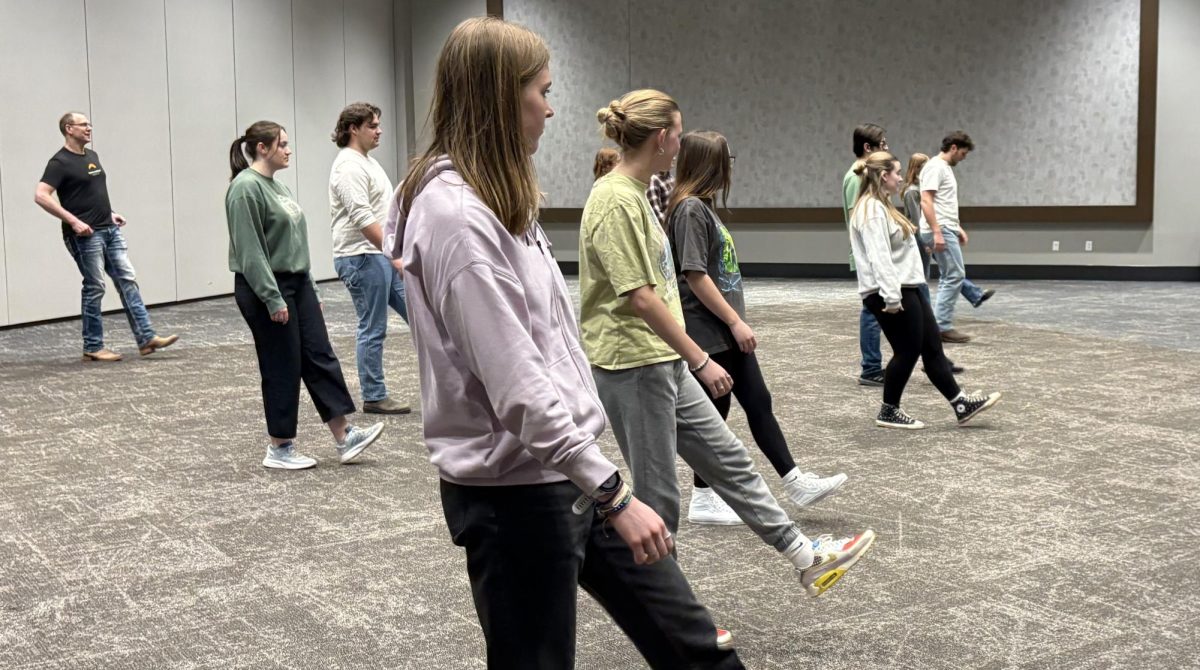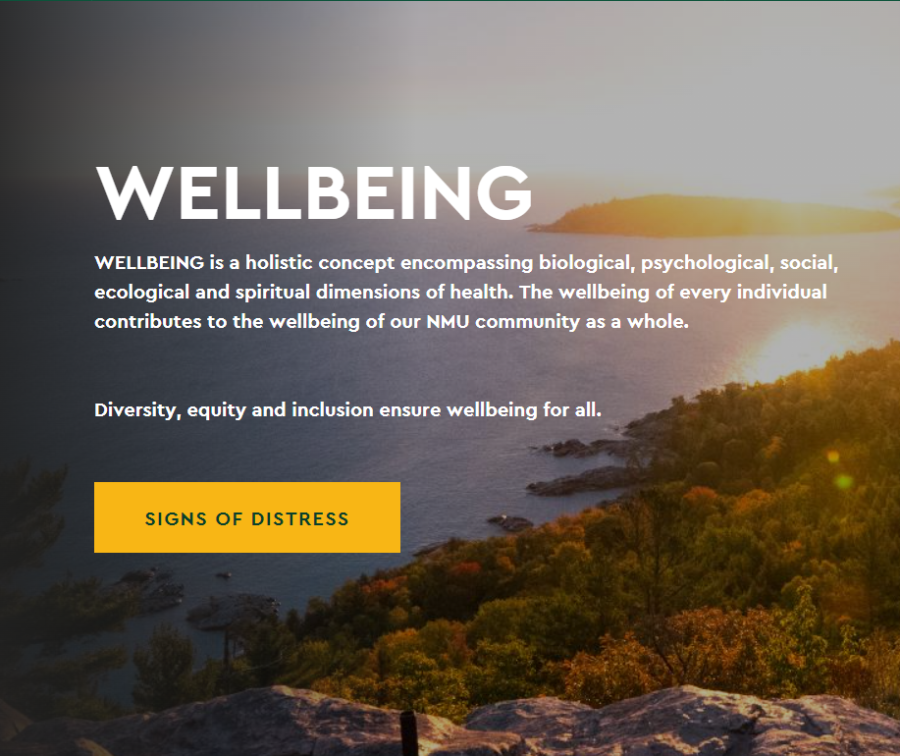Editorial — Critique of NMU’s Wellbeing website
September 15, 2022
In an attempt to improve student access to mental health services at NMU, campus administration has recently launched Wellbeing. The website, which contains mental health resources, reports on-campus mental health and the comprehensive “NMU Wellbeing Enhancement Plan,” and was created for students, faculty and staff to refer to when need-be.
The website is a response to conclusions made in Jim Haveman’s campus mental health assessment of NMU, which began in May and was submitted to campus administration on July 1. Haveman was hired by NMU to conduct the comprehensive assessment after the quality of NMU’s mental health services came into question during the winter 2022 semester.
In his report, Haveman stated: “NMU has a fragmented system of services for behavioral health and health care. Students, and even faculty, are often unaware of what services are available to them. They are often frustrated on how to access services. The data would suggest students are underserviced.”
Haveman encouraged the university to create a dashboard or website, where information regarding mental health services, like “health, wellness and counseling activities,” could be easily accessed.
Most of us are or know somebody who struggles with mental health issues. As a campus community, we have collectively experienced and persevered through the hardships that accompany mental illness. With September being National Suicide Prevention Month, we thought it would be appropriate to review and critique the Wellbeing website from the student’s perspective.
To begin, NMU has laid out four specific areas where they wish to see mental health improvements through their Wellbeing efforts: access and awareness, leadership and integration, crisis response, as well as continuous improvement.
These four areas include a plethora of information — 54 bullet points to be exact — that outline the goals that have either been completed, set into motion or will be tackled in the next two years.
While the density of information being provided on the site is a bit overwhelming, we appreciate some of the measures that are being prioritized. In particular, the creation of the new health and wellness center is set to “provide counseling space to community providers to provide services on campus.” This will be a great step up from the current state of affairs at the Center for Counseling and Consultation, which currently has a counselor-to-student ratio of 1-to-1500. The recommended ratio is 1-to-500.
Further, we are glad that NMU faculty are included on the site. While the campus population is obviously dominated by students, we would not be able to operate without our professors and instructors. Their mental health matters too.
Beyond that, we take issue with many of the resources and initiatives on the site.
Most of the resources that are being provided on the site are not new. A lot of the information has been plucked from other pages on NMU’s website, like NMU Wellness and NMU Counseling and Consultation.
As a campus community, we already knew of and had access to the provided resources, like DialHelp and the National Suicide and Crisis Lifeline, before the site was established. It feels like any information related to mental health that already existed on NMU’s website was compiled and simply given a new headline.
Plus, the provided sources are not tackling the issues that students want to be resolved. A single text or phone call to one of the provided hotlines is not going to solve our ongoing traumatic issues. We also need services that are designed to specifically help marginalized populations, like indigenous peoples, people of color and members of the LGBTQ+ community, who are too often underserved.
Within his report, Haveman states that “finances should not be a barrier to students getting behavioral health and other health services.” Despite this, the Wellbeing site currently promotes the MoveUP Fitness Program, a service that requires students to pay a $140 semester fee to participate.
If NMU would like to promote health and fitness as an answer to mental health issues on campus, the site should include more general information regarding the PEIF — which most students already have access to.
Within the employee resource section of the site is a Mental Health First Aid course. This course, while free, is designed to train NMU employees on how to respond to and appropriately deal with mental health issues when they arise. While we applaud any employee who participates, professors, advisors and other faculty members are not hired to be our therapists. They are hired to teach and guide our academic endeavors.
The most upsetting piece of information on the site, however, is the set goal of “being a ‘zero suicide’ campus by August 2023.”
While we understand the purpose of the phrase, did it really need to be mixed with the 53 other bullet points on the site — making it seem like an afterthought rather than a priority? This goal makes the events of the winter 2022 semester feel as if they were simply an “oopsie,” rather than a serious issue that needs to be openly addressed and handled by medical professionals.
What we crave most from NMU’s response to mental health services is to be treated like human beings. According to the most recent NMU Healthy Minds Survey, 70% of participants indicated that they needed help with “emotional or mental health problems.” Even further, 81% stated they needed help at the time the survey was conducted.
We want to be cared for like the valuable asset that we are to this campus, not just a statistic.
While “One Minute Wellness” emails and texts from the new Wildcat Willy chatbot can be helpful — and entertaining at times — their usefulness is limited in that they are simply reminders. We are once again craving a tangible response to mental health that can be felt, not just read and forgotten about.
Nevertheless, the establishment of the Wellbeing site is a much-needed step in the right direction for NMU’s mental health services. Considering how the university has dealt with issues regarding mental health in the past, their rush to action since last April’s tragedy has been comforting. While the current state of the site may be underwhelming, Neil Baumgartner, director of Student Success and Wellness, stated in an email sent to the campus community on Sept. 2 that it “will be updated on an ongoing basis.”
As NMU continues to roll out its Wellbeing Enhancement Plan, we recommend that they prioritize mental health resources and services that go beyond the written word. In particular, a focus on staffing professional counselors and ensuring that a “no wait” policy is instituted at the Health Center and Center for Counseling and Consultation would be greatly appreciated.
We also encourage the administration to request student input regarding the status of mental health services regularly.
If you or a friend are struggling with mental health, please reach out to the National Suicide Prevention Lifeline: 1-800-273-8255
Editor’s Note: The North Wind is committed to offering a free and open public forum of ideas, publishing a wide range of viewpoints to accurately represent the NMU student body. This is an editorial, written by the North Wind Editorial Board in its entirety. It reflects the majority views of the individuals who make up the editorial staff of the North Wind. It is the policy of the Editorial Board not to endorse candidates for any political office, in order to avoid aligning this public forum with particular political organizations.


























